Free City of Danzig Police on:
[Wikipedia]
[Google]
[Amazon]
 The Free City of Danzig Police (
The Free City of Danzig Police (

The Danzig Dilemma; a Study in Peacemaking by Compromise
p. 124-125 Arguments over the administration and authority of this branch led to much tension between the Free City's Senate and the Polish government. The Danzig Senate asserted it had the responsibility of upholding the law and could not surrender its executive powers to an external force. Poland argued its economic rights in the city could not be guaranteed if Danzig had the power to arbitrarily interfere with Polish shipping. In 1933 the Senate resolved to place the harbour under the direct protection of the regular police. Poland protested to the city's High Commissioner, but ultimately the League of Nations dismissed their complaint. In June 1934 Poland and
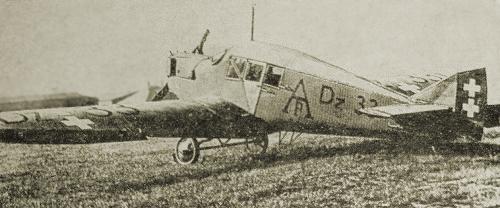 A police air squadron was established in November 1919 in
A police air squadron was established in November 1919 in
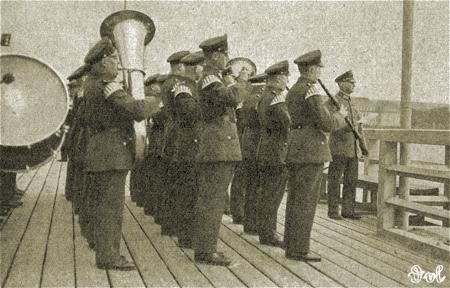 On 9 April 1920, a military style marching band, the ''Musikkorps'', was created. It was led by ''Obermusikmeister'' , a well-respected composer, and became prominent throughout the city and Europe.
On 9 April 1920, a military style marching band, the ''Musikkorps'', was created. It was led by ''Obermusikmeister'' , a well-respected composer, and became prominent throughout the city and Europe.
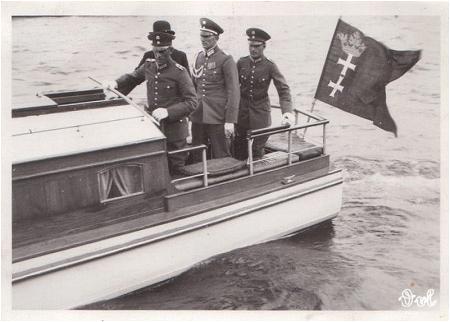 In 1921, Danzig's government reformed the entire institution and established the ''
In 1921, Danzig's government reformed the entire institution and established the ''
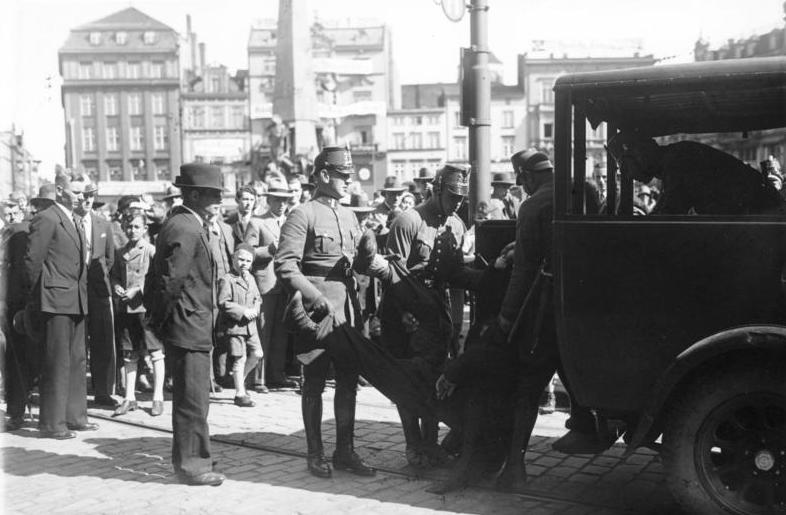
 After the Nazi takeover of the Senate in 1933, the police were increasingly used to suppress free speech and political dissent.Policja. Kwartalnik kadry kierowniczej Policji
After the Nazi takeover of the Senate in 1933, the police were increasingly used to suppress free speech and political dissent.Policja. Kwartalnik kadry kierowniczej Policji
(in Polish) The constabulary itself was also directly affected. On 31 October 1933, in a speech made to the Police Administration Professional Union, according to the newspaper ''Danziger Neueste Nachrichten'', the vice-president of the Danzig Senate said, This was in conjunction with a subsequent dissolution and ban on professional
This was in conjunction with a subsequent dissolution and ban on professional
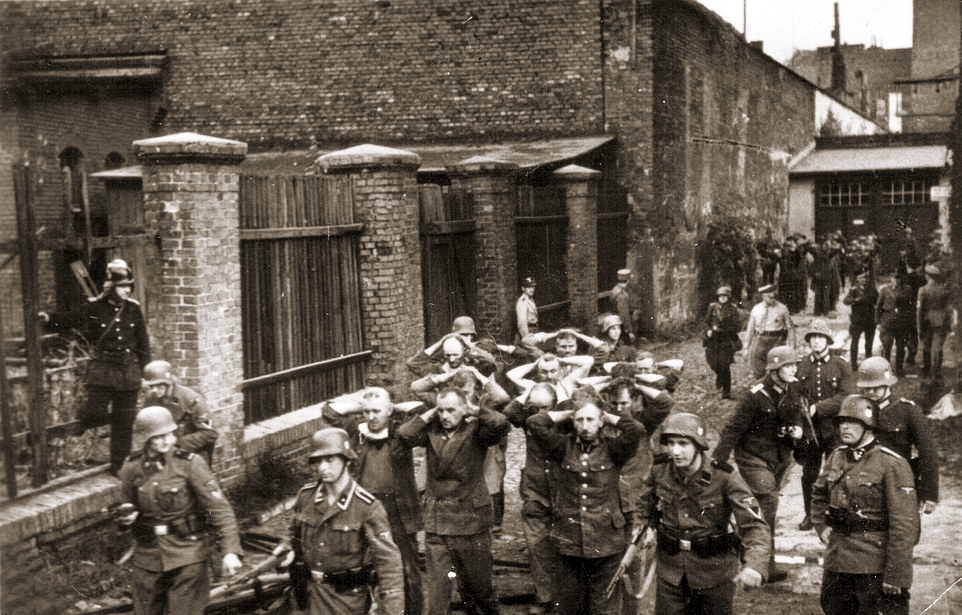 By 1939, Polish-German relations had broken down and war seemed a likely possibility. Danzig security authorities began drawing up plans to seize Polish installations throughout the city, in the event of a German offensive into the
By 1939, Polish-German relations had broken down and war seemed a likely possibility. Danzig security authorities began drawing up plans to seize Polish installations throughout the city, in the event of a German offensive into the
They assisted the Germans in organizing military forces within the city throughout August 1939. On 1 September, the German
Poland Betrayed: The Nazi-Soviet Invasions of 1939
p. 66
www.danzig-online.pl/grenze/polizeie.html
{{Webarchive, url=https://web.archive.org/web/20160304091715/http://www.danzig-online.pl/grenze/polizeie.html , date=2016-03-04
History of Gdańsk Law enforcement agencies of Poland Defunct law enforcement agencies of the Weimar Republic 1940s disestablishments Government agencies established in 1921
 The Free City of Danzig Police (
The Free City of Danzig Police (German
German(s) may refer to:
* Germany (of or related to)
**Germania (historical use)
* Germans, citizens of Germany, people of German ancestry, or native speakers of the German language
** For citizens of Germany, see also German nationality law
**Ger ...
: ''Polizei der Freien Stadt Danzig'') or ''Schutzpolizei'', as it was known locally, was a state constabulary Constabulary may have several definitions:
*A civil, non-paramilitary (police) force consisting of police officers called constables. This is the usual definition in the United Kingdom, in which all county police forces once bore the title (and som ...
and the official law enforcement
Law enforcement is the activity of some members of government who act in an organized manner to enforce the law by discovering, deterring, rehabilitating, or punishing people who violate the rules and norms governing that society. The term en ...
agency within the Free City of Danzig
The Free City of Danzig (german: Freie Stadt Danzig; pl, Wolne Miasto Gdańsk; csb, Wòlny Gard Gduńsk) was a city-state under the protection of the League of Nations between 1920 and 1939, consisting of the Baltic Sea port of Danzig (now Gda ...
, primarily from 1921 to 1939.
Organization
General Police
TheLeague of Nations
The League of Nations (french: link=no, Société des Nations ) was the first worldwide intergovernmental organisation whose principal mission was to maintain world peace. It was founded on 10 January 1920 by the Paris Peace Conference that ...
allowed for the Free City of Danzig
The Free City of Danzig (german: Freie Stadt Danzig; pl, Wolne Miasto Gdańsk; csb, Wòlny Gard Gduńsk) was a city-state under the protection of the League of Nations between 1920 and 1939, consisting of the Baltic Sea port of Danzig (now Gda ...
to maintain a regular police force of several hundred men, which was bolstered by a poorly trained and ill-equipped citizens' militia with approximately 3,000 members. The constabulary reported to the Danzig Senate's Department of Internal Affairs. The police principally operated from 12 precincts, called ''Revier'', and 7 registration points. Initially, they were organized as follows:
In 1926 the constabulary was reformed and the number of ''reviers'' was reduced to 9. They were as follows:

Other Branches
Railway Police
The Polish Railway Administration employed members of the police to provide security for their railways. Paid for by the Polish government, the railway police were subject to both Danzig's general policing laws and the by–laws and direction of the railway administration.Harbour Police
A coast guard/harbour police section, called ''Küstenschutz der Danziger Polizei'', was also maintained. It initially was a force of 120 individuals which were managed by Danzig's Harbour Board. One section was to provide aid in navigation, while the other maintained safety and security.Mason, John Brown. Stanford University PressThe Danzig Dilemma; a Study in Peacemaking by Compromise
p. 124-125 Arguments over the administration and authority of this branch led to much tension between the Free City's Senate and the Polish government. The Danzig Senate asserted it had the responsibility of upholding the law and could not surrender its executive powers to an external force. Poland argued its economic rights in the city could not be guaranteed if Danzig had the power to arbitrarily interfere with Polish shipping. In 1933 the Senate resolved to place the harbour under the direct protection of the regular police. Poland protested to the city's High Commissioner, but ultimately the League of Nations dismissed their complaint. In June 1934 Poland and
Nazi Germany
Nazi Germany (lit. "National Socialist State"), ' (lit. "Nazi State") for short; also ' (lit. "National Socialist Germany") (officially known as the German Reich from 1933 until 1943, and the Greater German Reich from 1943 to 1945) was ...
reached an agreement by which the Harbour Board would directly employ 12 Poles and 12 Danzigers to protect the port, under charge of the chief pilot. The Senate granted them the status of auxiliary police.
Air police
 A police air squadron was established in November 1919 in
A police air squadron was established in November 1919 in Langfuhr
Wrzeszcz (pronounced , german: Langfuhr; csb, Wrzészcz) is one of the boroughs of the Northern Polish city of Gdańsk. With a population of more than 65,000 in an area of (population density 6,622), Wrzeszcz is the most populous part of Gdańs ...
with 25 members, including four pilots and two gunners. The squadron would ultimately field 20 different types of aircraft, including the Albatros C.XII
The Albatros C.XII was a German military reconnaissance aircraft which saw service during World War I. It differed markedly from previous Albatros C-type aircraft by adopting an elliptical-section fuselage similar to that of the Albatros D.V. The ...
and the Fokker D.VII
The Fokker D.VII was a German World War I fighter aircraft designed by Reinhold Platz of the Fokker-Flugzeugwerke. Germany produced around 3,300 D.VII aircraft in the second half of 1918. In service with the ''Luftstreitkräfte'', the D.VII qu ...
. The squadron spent most of its time doing exercises and couriering. In May 1920 the implementation of the Treaty of Versailles
The Treaty of Versailles (french: Traité de Versailles; german: Versailler Vertrag, ) was the most important of the peace treaties of World War I. It ended the state of war between Germany and the Allied Powers. It was signed on 28 June ...
outlawed the force. On 21 November the aircraft were requisitioned by Poland and the squadron was dissolved.
The squadron was replaced with the ''Fliegerzeug der Verkehrshundertschaft der Schutzpolizei der Freien Stadt Danzig'', also known as the ''Luftaufsicht''. Most of the staff were carried over from the previous unit. In mid-1922 the force was renamed ''Luftfahrtüberwachungsstelle (L.Ü.St.)''. It was usually under the command of a police captain. In addition to the station in Langfuhr, the water airport in Plehnendorf ( Rudniki) was used for auxiliary purposes.
History
Establishment and early years
After the end ofWorld War I
World War I (28 July 1914 11 November 1918), often abbreviated as WWI, was one of the deadliest global conflicts in history. Belligerents included much of Europe, the Russian Empire, the United States, and the Ottoman Empire, with fightin ...
Danzig was left without the administration of the German authorities. On 19 August 1919, the ''Sicherheitspolizei'', or security police (called ''Sipo'' for short) was formed to protect the city's citizens and maintain order. Officers wore traditional dark blue uniforms with black shako
A shako (, , or ) is a tall, cylindrical military cap, usually with a visor, and sometimes tapered at the top. It is usually adorned with an ornamental plate or badge on the front, metallic or otherwise; and often has a feather, plume (see hackle) ...
caps.
 On 9 April 1920, a military style marching band, the ''Musikkorps'', was created. It was led by ''Obermusikmeister'' , a well-respected composer, and became prominent throughout the city and Europe.
On 9 April 1920, a military style marching band, the ''Musikkorps'', was created. It was led by ''Obermusikmeister'' , a well-respected composer, and became prominent throughout the city and Europe.
 In 1921, Danzig's government reformed the entire institution and established the ''
In 1921, Danzig's government reformed the entire institution and established the ''Schutzpolizei
The ''Schutzpolizei'' (), or ''Schupo'' () for short, is a uniform-wearing branch of the '' Landespolizei'', the state (''Land'') level police of the states of Germany. ''Schutzpolizei'' literally means security or protection police, but it is ...
'', or protection police (''Schupo'' for short). On 1 April Helmut Froböss was chosen to be the President of the Police ( German: ''Der Polizei-Präsident''). He would serve in this post until late 1939.
In 1922 the police began introducing new gray-green caps and uniforms. The caps were now adorned with a coat of arms inscribed with the city's motto, " Nec Temere, Nec Timide". By 1 December 1924, they had completely replaced the traditional attire.
Nazism, political repression, and conflict with Poland

(in Polish) The constabulary itself was also directly affected. On 31 October 1933, in a speech made to the Police Administration Professional Union, according to the newspaper ''Danziger Neueste Nachrichten'', the vice-president of the Danzig Senate said,
 This was in conjunction with a subsequent dissolution and ban on professional
This was in conjunction with a subsequent dissolution and ban on professional union
Union commonly refers to:
* Trade union, an organization of workers
* Union (set theory), in mathematics, a fundamental operation on sets
Union may also refer to:
Arts and entertainment
Music
* Union (band), an American rock group
** ''Un ...
s within the state constabulary. The speech and the ban were the subject of much criticism in the 2 November editions of the oppositional newspapers ''Danziger Landeszeitung'' and ''Danziger Volksstimme'', which accused the Senate of violating public officials' constitutional rights. The following day Police President Froböss, citing Article II, section 5, of the ''Legal Ordinance concerning Measures for ensuring Public Safety and Order of June 30th, 1933'', ordered them to suspend publications for 8 days and 2 months respectively. The papers' editors appealed to the League of Nations High Commissioner of Danzig, Helmer Rosting, to step in. The ''Volksstimme'' also petitioned the Senate to withdraw the ban, who rejected it. On 5 November, Froböss, citing a possible danger to the state, took the editor-in-chief of the ''Landeszeitung'' and an editor from the ''Volksstimme'' into "protective custody
Protective custody (PC) is a type of imprisonment (or care) to protect a person from harm, either from outside sources or other prisoners. Many prison administrators believe the level of violence, or the underlying threat of violence within pri ...
," predicting their papers would continue to criticize the decisions of the government. After investigating the matter himself, Commissioner Rosting forwarded the appeals to the Secretary General
Secretary is a title often used in organizations to indicate a person having a certain amount of authority, power, or importance in the organization. Secretaries announce important events and communicate to the organization. The term is derived ...
of the League of Nations
The League of Nations (french: link=no, Société des Nations ) was the first worldwide intergovernmental organisation whose principal mission was to maintain world peace. It was founded on 10 January 1920 by the Paris Peace Conference that ...
, where they were ultimately dismissed.
In 1935, the police begin wearing caps with Totenkopf
''Totenkopf'' (, i.e. ''skull'', literally "dead person's head") is the German word for the skull and crossbones symbol. The "skull and crossbones" symbol is an old international symbol for death, the defiance of death, danger, or the dead, as ...
.
On 20 June 1938, an awards system for length of service in the force is established. Silver medals, silver crosses, and gold crosses are awarded for 8, 18, and 25 years of service respectively.
On 20 July 1939, a customs officer shot and killed a Polish soldier along the border. Danzig authorities maintained that the officer had fired in self-defense, while Polish officials asserted that the soldier had been in Polish territory at the time. The shooting coincided with the sentencing of a Polish public official to 14 months in prison in Danzig and the arrest of a Polish army officer in the city, further straining relations.
Treatment of Jews
In spite of the Nazi influence, the police kept relatively cordial relations with the local Jewish population. Officials often cooperated with Jewish leaders for fear that excessive oppression would result in a Polish intervention. The police also assisted the Jews in protecting the Great Synagogue fromarson
Arson is the crime of willfully and deliberately setting fire to or charring property. Although the act of arson typically involves buildings, the term can also refer to the intentional burning of other things, such as motor vehicles, wat ...
attacks on 12 and 13 November 1938. In 1939 the police granted a permit for the transfer of historical artifacts from the city to the Jewish Theological Seminary of America
The Jewish Theological Seminary (JTS) is a Conservative Jewish education organization in New York City, New York. It is one of the academic and spiritual centers of Conservative Judaism and a major center for academic scholarship in Jewish studie ...
in the United States
The United States of America (U.S.A. or USA), commonly known as the United States (U.S. or US) or America, is a country primarily located in North America. It consists of 50 states, a federal district, five major unincorporated territorie ...
. They helped to facilitate emigration from the Free City to Poland
Poland, officially the Republic of Poland, is a country in Central Europe. It is divided into 16 administrative provinces called voivodeships, covering an area of . Poland has a population of over 38 million and is the fifth-most populous ...
as a peaceful and orderly means of getting rid of the Jews.
Polish-German tensions and the Invasion of Poland
 By 1939, Polish-German relations had broken down and war seemed a likely possibility. Danzig security authorities began drawing up plans to seize Polish installations throughout the city, in the event of a German offensive into the
By 1939, Polish-German relations had broken down and war seemed a likely possibility. Danzig security authorities began drawing up plans to seize Polish installations throughout the city, in the event of a German offensive into the Polish Corridor
The Polish Corridor (german: Polnischer Korridor; pl, Pomorze, Polski Korytarz), also known as the Danzig Corridor, Corridor to the Sea or Gdańsk Corridor, was a territory located in the region of Pomerelia (Pomeranian Voivodeship, eastern ...
.Danzig: Der Kampf um die polnische PostThey assisted the Germans in organizing military forces within the city throughout August 1939. On 1 September, the German
pre-dreadnought
Pre-dreadnought battleships were sea-going battleships built between the mid- to late- 1880s and 1905, before the launch of in 1906. The pre-dreadnought ships replaced the ironclad battleships of the 1870s and 1880s. Built from steel, prote ...
''SMS Schleswig-Holstein
SMS ''Schleswig-Holstein'' () was the last of the five pre-dreadnought s built by the German Kaiserliche Marine. The ship, named for the province of Schleswig-Holstein, was laid down in the Germaniawerft dockyard in Kiel in August 1905 and co ...
'' began shelling the Polish garrison at Westerplatte. Shortly thereafter Danzig police, under the command of ''Polezeioberst'' Willi Bethke, launched an attack on the city's Polish Post Office. The coast guard unit of the police assisted the Germans at Westerplatte
Westerplatte is a peninsula in Gdańsk, Poland, located on the Baltic Sea coast mouth of the Dead Vistula (one of the Vistula delta estuaries), in the Gdańsk harbour channel. From 1926 to 1939, it was the location of a Polish Military Transi ...
.Williamson, D. GPoland Betrayed: The Nazi-Soviet Invasions of 1939
p. 66
After the Invasion of Poland
The Danzig police was taken over by theGestapo
The (), abbreviated Gestapo (; ), was the official secret police of Nazi Germany and in German-occupied Europe.
The force was created by Hermann Göring in 1933 by combining the various political police agencies of Prussia into one organi ...
after the invasion. Helmut Froböss left his job and became president of the provincial German high court. Stutthof
Stutthof was a Nazi concentration camp established by Nazi Germany in a secluded, marshy, and wooded area near the village of Stutthof (now Sztutowo) 34 km (21 mi) east of the city of Danzig ( Gdańsk) in the territory of the Germ ...
, 22 miles east of the city, was run by the new President of Police as an internment camp from 1939 until it was handed over to the Germans as a political prisoner camp in November 1941. Bombing by the Soviets in 1945 killed ''Obermusikmeister'' Ernst Stieberitz. All vestiges of the Danzig Police were eliminated when the Red Army
The Workers' and Peasants' Red Army (Russian: Рабо́че-крестья́нская Кра́сная армия),) often shortened to the Red Army, was the army and air force of the Russian Soviet Federative Socialist Republic and, after ...
captured the city on 28 March 1945.
See also
*SG OrPo Danzig
SG OrPo Danzig was a Football in Germany, German association football club from the city of Danzig, West Prussia (today Gdańsk, Poland). It was established in 1920 as ''Sportverein Schutzpolizei Danzig'' as the sports club of the city's Free Cit ...
Citations
References
*External links
www.danzig-online.pl/grenze/polizeie.html
{{Webarchive, url=https://web.archive.org/web/20160304091715/http://www.danzig-online.pl/grenze/polizeie.html , date=2016-03-04
History of Gdańsk Law enforcement agencies of Poland Defunct law enforcement agencies of the Weimar Republic 1940s disestablishments Government agencies established in 1921